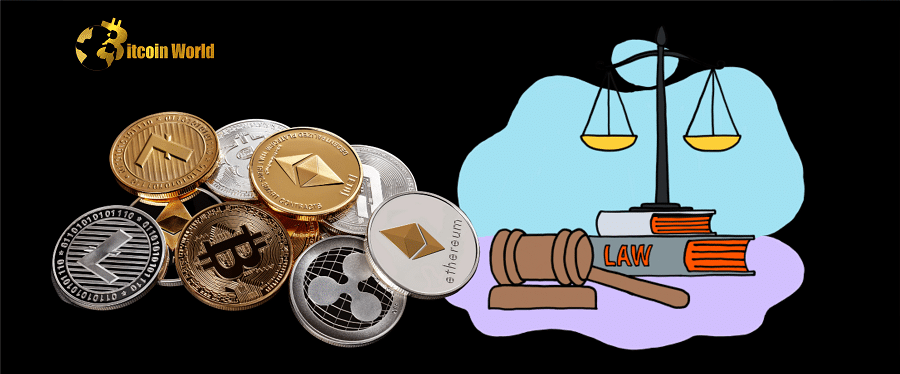The world of cryptocurrency and Web3 is rapidly evolving, bringing with it exciting opportunities and, let’s be honest, a fair share of complexity. As blockchain technology continues to disrupt industries, one thing is becoming increasingly clear: if you’re a lawyer with a knack for crypto and blockchain, your skills are about to be in serious demand. But why is this happening, and what does it mean for the future of Web3 businesses?
Why the Sudden Surge in Demand for Crypto Lawyers?
Think about the current landscape. We’ve seen incredible innovation in the crypto space, but also significant market events, like the collapse of FTX. These events have naturally caught the attention of regulators worldwide. As regulatory pressure mounts, businesses operating in the Web3 space are realizing they need expert legal guidance more than ever. This is where crypto-savvy lawyers step into the spotlight.
Two prominent legal professors emphasize this growing need. They believe that lawyers well-versed in crypto will be indispensable for Web3 enterprises, especially as the industry prepares for potential regulatory changes in the wake of recent market turbulence. It’s not just about understanding the law; it’s about understanding the technology and how it intersects with the legal framework.
Web3 Lawyers: More Than Just Legal Advisors?
According to Thomas Hook, a professor at Boston Law School and also the chief compliance officer at cryptocurrency exchange Bitstamp, Web3 lawyers are quickly becoming “business differentiators.” This isn’t just about ticking legal boxes; it’s about strategic advantage. Hook points out that these lawyers are tasked with the challenging job of guiding companies through a maze of legal and regulatory uncertainties. Their expertise can directly impact a company’s ability to innovate and thrive.
In his words:
“Given the lack of clarity in many regulations and the complexity, Web3 companies will continue to need legal and compliance representatives to support them. These types of individuals are becoming business differentiators as they can help or hinder a business to get to market quickly in a legal and compliant manner.”
Essentially, a skilled Web3 lawyer can be the key to unlocking a company’s potential, ensuring they can launch products and services efficiently and within legal boundaries. Without this expertise, businesses might face significant hurdles as regulators seek to establish control over the industry.
Navigating the Legal Minefield: What Challenges Do Web3 Companies Face?
Dr. Aaron Lane, a Senior Research Fellow at RMIT’s Blockchain Innovation Hub, echoes this sentiment, advising Web3 enterprises to proceed with caution and seek legal counsel proactively. He highlights a crucial distinction:
“Entrepreneurs are used to making decisions under economic uncertainty but are not as good at operating under legal uncertainty.”
Web3 is characterized by rapid technological advancements. Couple this with the increasing attention from lawmakers – Dr. Lane mentions over 50 digital asset laws being introduced in the US Congress alone – and you have a complex legal landscape that’s constantly shifting. For businesses in this space, understanding and adapting to these legal changes is paramount.
What Makes a Top-Tier Web3 Lawyer? The Commercial Law Connection
So, what kind of legal background is best suited for the Web3 world? Dr. Lane believes that the foundation of a great Web3 lawyer lies in commercial law. He considers this background “crucial” for navigating the intricacies of crypto law.
He explains:
“A good Web3 lawyer will be a good commercial lawyer. The best Web3 lawyers in the field today started out as commercial lawyers of one kind or another and I expect that core foundation will continue to be crucial.”
In essence, the principles of commercial law provide a robust framework for understanding the legal aspects of Web3. However, it’s not just about traditional legal knowledge. Lane also emphasizes the growing importance of technological understanding:
“Knowledge of the technologies that comprise the Web3 stack will be increasingly in demand over the coming decade,”
Therefore, the ideal Web3 lawyer is a hybrid – someone with a solid grounding in commercial law, coupled with a deep understanding of blockchain and crypto technologies. This combination of legal and technical expertise is what will truly set lawyers apart in this burgeoning field.
Is the Web3 Legal Field Wide Open? Not Quite Yet
While the demand for crypto lawyers is on the rise, the field is still considered “extremely narrow” for now, according to Neil Dundon, founder of CryptoRecruit. This suggests that while opportunities are emerging, the specialized nature of Web3 law means it’s still a niche area within the broader legal profession.
External Counsel vs. In-House: The Current Trend
Currently, many Web3 firms are relying on external legal counsel for their needs, rather than building large in-house legal teams. Dr. Lane notes that external lawyers are often specialized in areas like financial services and securities legislation, which are highly relevant to the Web3 space. This suggests that for many Web3 companies, particularly in the early stages, outsourcing legal expertise is a practical and efficient approach.
The Future is Legal (and Crypto-Savvy)
The message is clear: the intersection of law and Web3 is becoming increasingly critical. As the industry matures and faces greater regulatory scrutiny, the demand for lawyers who understand both the legal and technical aspects of blockchain and cryptocurrency will only continue to grow. For legal professionals looking to specialize in a cutting-edge field, Web3 law presents a compelling and rapidly expanding opportunity. The ability to navigate the legal complexities of this innovative space will not only be a valuable skill but a crucial asset for the future of Web3 businesses.
Disclaimer: The information provided is not trading advice, Bitcoinworld.co.in holds no liability for any investments made based on the information provided on this page. We strongly recommend independent research and/or consultation with a qualified professional before making any investment decisions.


